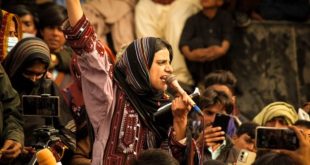GENEVA, Dec 03 (IPS) – On the core of landmark Safety Council Decision 1325 (2000) on Girls, Peace and Safety is the assertion of girls’s proper to take part in selections associated to struggle and peace.
“What does the Girls, Peace and Safety Agenda must do with arms management and disarmament?”.
Underneath various formulations, this query retains arising each time somebody refers back to the Girls, Peace and Safety (WPS) Agenda as a foundation for making certain that girls’s voices and their particular safety wants have been taken into consideration in multilateral arms management discussions.
Even for these supportive of bringing gender equality considerations to disarmament fora, the linkages between WPS and arms management weren’t all the time clear. To deal with this, UNIDIR’s Gender and Disarmament programme initiated a nine-month analysis mission that resulted in Connecting the Dots, a report that outlines the interconnections between arms management and the WPS Agenda and units out concrete concepts for additional dialogue and collaboration amongst distinct coverage communities.
Shared targets
The WPS Agenda and arms management and disarmament share the broader aim of stopping and lowering armed violence. The present pattern in direction of gender-responsive arms control is strengthening these synergies, highlighting the significance of girls’s significant participation in discussions associated to weapons.
On the core of landmark Security Council Resolution 1325 (2000) on Girls, Peace and Safety is the assertion of girls’s proper to take part in selections associated to struggle and peace.
Likewise, that decision acknowledges that battle impacts girls and women in another way to males and, subsequently, disaster administration, humanitarian and improvement responses have to take account of the precise wants of girls and women.
Since SCR 1325 (2000), the Safety Council has adopted ten resolutions on WPS, collectively forming the idea for what’s also known as the WPS Agenda. It’s generally outlined as having 4 interconnected pillars:
- Significant participation of girls in decision-making processes in any respect ranges and in all facets of worldwide safety;
- Prevention of violence towards girls and women and of any violation of their rights;
- Safety of girls and women from all types of violence and from any violation of their rights;
- Aid and Restoration, that’s, making certain that the voices and considerations of girls and women are accounted for when creating the structural situations needed for sustainable peace.
Arms management and disarmament measures can strengthen all these pillars, successfully serving to to implement the WPS Agenda. Regardless of these convergences, multilateral processes on WPS have not often addressed the governance of weapons.
For its half, initiatives within the subject of arms management and disarmament to enhance girls’s participation and deal with gendered impacts of weapons haven’t been framed explicitly in reference to the WPS Agenda.
Misconceptions
How will we clarify this disconnect? UNIDIR discovered two misconceptions that hinder the mixing of WPS and arms management.
First, is the idea that gender relates primarily and even completely to girls and women. This isn’t the case. Gender is a broad assemble that refers back to the roles, behaviours, actions and attributes given society at a given time considers applicable or a “norm” for ladies and men, for women and boys, and for non-binary or gender-fluid folks.
Gender norms are socially constructed variations – versus organic variations (intercourse) – they usually operate as social guidelines of behaviour, setting out what’s fascinating and doable to do as a person or a lady in a given context.
Gender factors to a relational view of male, feminine, and trans classes as contextually and relationally outlined. Thus, the best way girls work together with problems with weapons and armed battle can’t be addressed by focusing solely on girls.
For this dialog to be efficient, males and masculinities should be a part of the Agenda. Furthermore, so long as gender-related debates are thought-about “girls’s points”, their attain will likely be restricted and progress in direction of the mixing of gender views into arms management and disarmament will likely be gradual.
The second false impression is that WPS resolutions solely apply to battle or post-conflict conditions and, thus, wouldn’t be related to multilateral arms management processes, which are typically seen as devices negotiated by and for societies thought-about to be at peace.
However this isn’t true, as most of the WPS-related actions are related in peacetime as effectively, particularly those who cope with prevention of violence usually and of violence towards girls and women. Femicides, by which weapons play a job, are notably seen in areas or nations which might be in any other case comparatively peaceable.
Shifting ahead
Because the WPS Agenda enters its third decade, states and civil society actors are in search of methods to strengthen its implementation. UNIDIR’s analysis provides a number of suggestions to contribute to these efforts.
- Transcend merely including girls. Efforts must be taken to make sure that girls, males and individuals of different gender identities affected by armed violence can meaningfully take part in arms management and disarmament. This might take participation to the subsequent stage, overcoming the simplistic notion that gender equates to girls.
- Along with small arms management, the targets of prevention and safety ought to inform multilateral processes on cybersecurity. In spite of everything, on-line gender-based violence (GBV) is a severe challenge and it might probably flip into armed violence, as we’ve seen in assaults perpetrated by the so-called incels.
- Classes discovered from gender-sensitive sufferer help in mine motion must be utilized to protocols and agreements coping with weapons of mass destruction. In view of sex-specific and gendered effects of chemical, biological and nuclear weapons, a gender-responsive method to help underneath WMD treaties might assist states and their populations to grow to be extra resilient and recuperate extra quickly.
Finally, the WPS Agenda supplies a sensible construction for the great integration of gender views throughout the entire vary of arms management and disarmament processes. Bringing these coverage areas nearer must be of equal curiosity to each arms management practitioners in addition to WPS advocates.
This piece presents findings from a bigger analysis mission. The creator is grateful to Dr. Renata Dwan and Dr. Henri Myrttinen for his or her contribution and insights.
The opinions articulated above signify the views of the creator, and don’t essentially replicate the place of the European Management Community (ELN) or any of the ELN’s members. The ELN’s goal is to encourage debates that can assist develop Europe’s capability to handle urgent international, defence, and safety challenges.
Follow @IPSNewsUNBureau
Follow IPS News UN Bureau on Instagram
© Inter Press Service (2020) — All Rights ReservedOriginal source: Inter Press Service
 Top Naija News – Nigeria News, Nigerian News & Top Stories Top Naija News – Nigerian Newspapers, Nigerian News. topnaijanews is a daily Nigerian newspaper covering Latest News, Breaking News, Entertainment, Sports, Lifestyle and Politics.
Top Naija News – Nigeria News, Nigerian News & Top Stories Top Naija News – Nigerian Newspapers, Nigerian News. topnaijanews is a daily Nigerian newspaper covering Latest News, Breaking News, Entertainment, Sports, Lifestyle and Politics.




